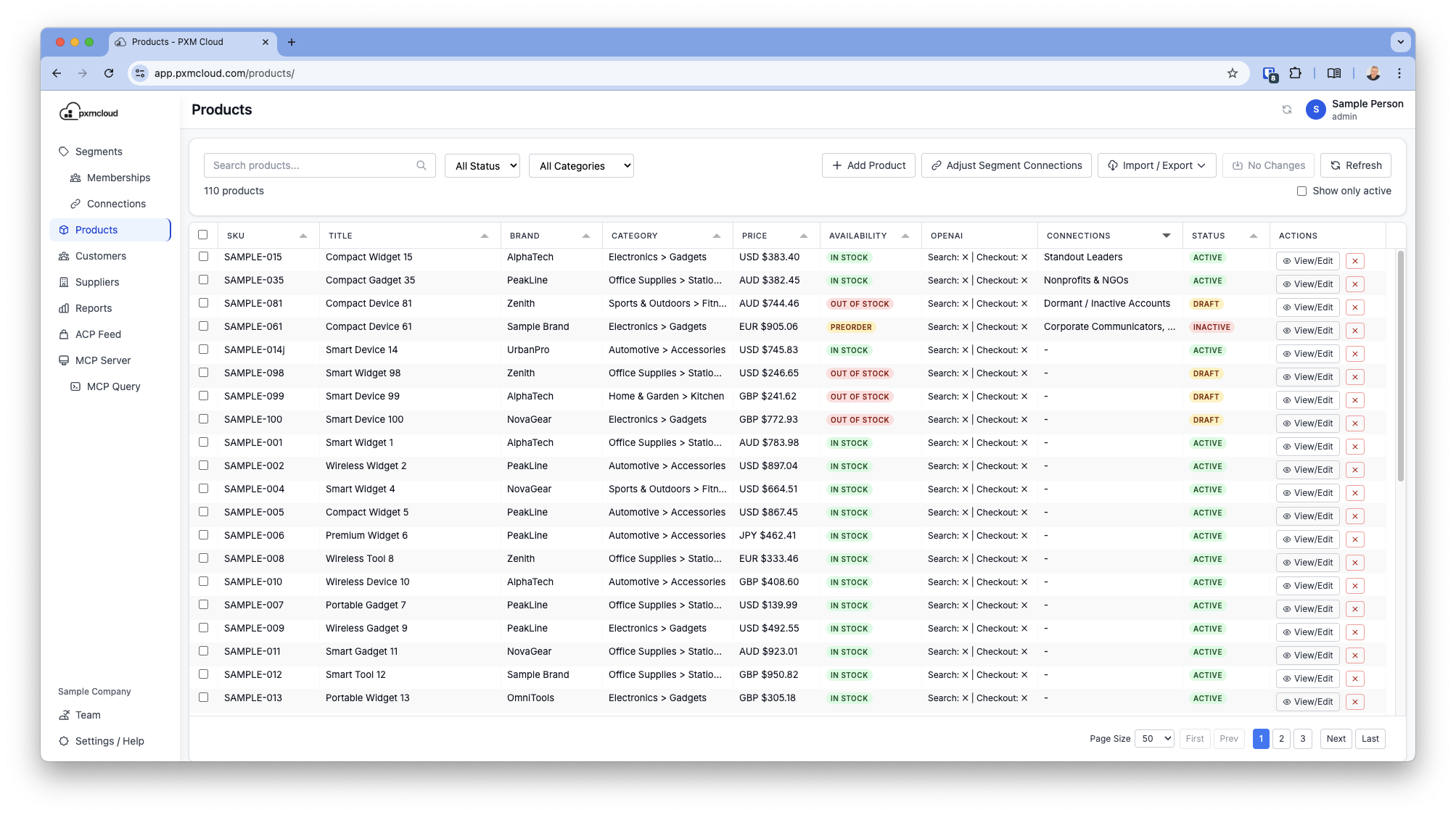PXMcloud App Features
Experience the power of AI-driven product management with our comprehensive platform
Customer Segmentation
Create and manage customer segments with intelligent categorization and membership tracking for targeted experiences.

Product Management
Centralized product information management with AI-powered optimization and multi-channel distribution capabilities.

Customer Intelligence
Customer relationship management connecting behavioral analytics and personalized engagement tracking.

Agentic Commerce (ACP Feed)
AI-powered autonomous shopping experiences with OpenAI's ACP integration for intelligent product discovery and purchasing.

Analytics & Reports
Analytics and reporting tools with real-time insights into customer connections, product segmentation and data patterns.

MCP Server (coming soon)
Model Context Protocol server for seamless AI agent integration and advanced query capabilities.

AI-Powered Product Experience Management
PXMcloud.com is the AI-powered product experience management system that transforms how businesses create, manage, and optimize personalized product experiences across all customer touchpoints.

AI-Aware Personalization
Leverage AI tools to search and solve product experiences based on customer segmentation, preferences, and data patterns.

Connect products to AI agents
AI-powered insights that help you find your customers and optimize product experiences, customer journeys, and conversion rates across all channels.

Agentic Commerce
Connect your products directly with AI agents that help customers discover, evaluate and purchase powered by OpenAI's ACP.
Product Information Management
PIM
Product Information Management (PIM) is the foundation for handling all the structured information that describes and supports a product. A PIM system centralizes product data such as names, SKUs, technical specifications, attributes, dimensions, pricing, digital assets (images, manuals, videos), and regulatory information into a single, authoritative repository. Instead of data being scattered across spreadsheets, ERP systems, or e-commerce platforms, PIM ensures consistency and accuracy across all channels.
PIM is especially critical for organizations with complex catalogs, multiple sales channels, or international operations. It supports workflows like translation, versioning, and approval processes, allowing teams to collaborate on creating "one source of truth." This improves internal efficiency, reduces errors, and enables faster time to market. At its core, PIM is about managing data integrity and distribution at scale. Learn more about PIM implementation strategies.
Product Experience Management
PXM
Product Experience Management (PXM) builds on the data foundation provided by PIM but focuses on how that product information is experienced by end customers. PXM is not just about storing and syndicating data it's about contextualizing and personalizing product content for different audiences, channels, and markets.
Where PIM ensures that the raw data is accurate, PXM ensures that the presentation of that data resonates with customers.
The evolution of PXM leads naturally to Agentic Commerce, where AI agents can autonomously navigate and utilize product feeds to deliver personalized shopping experiences. Agentic Commerce Platform (ACP) represents the next frontier, where PXM's personalized experiences are enhanced by AI agents that can discover, evaluate, and purchase products on behalf of customers.
In today's omnichannel environment, PXM is essential. Customers expect a consistent but also contextually relevant experience whether they are shopping on a direct-to-consumer website, a marketplace, social commerce, or in-store. The future lies in Agentic Commerce, where AI agents handle the complexity while delivering effortless, personalized experiences.
The Relationship Between PIM, PXM, and Agentic Commerce
PIM, PXM, and Agentic Commerce form a powerful progression in modern commerce technology. PIM systems provide the accurate, structured product information that forms the foundation of commerce. Without clean, centralized data, it's impossible to deliver a coherent product experience. PXM systems, in turn, leverage that information to craft experiences that engage customers, drive conversions, and build loyalty.
Think of PIM as the engine room, ensuring all data is correct, complete, and up to date. PXM is the customer-facing stage, where that information is turned into persuasive, differentiated experiences. Agentic Commerce represents the intelligent automation layer, where AI agents can autonomously navigate and utilize the rich product data and personalized experiences to deliver effortless shopping.
Together, they form a complete continuum: PIM handles "what the product is," PXM focuses on "how the product feels" to the buyer, and Agentic Commerce enables "how the product is discovered and purchased" through AI-powered automation. Organizations that implement all three effectively are able to achieve operational efficiency, delight customers at every touchpoint, and provide truly intelligent, autonomous shopping experiences.

How CRM Enhances PIM and PXM
Customer Relationship Management (CRM) integration transforms both PIM systems and PXM from static data management into dynamic, customer-centric systems. With CRM data, PIM can prioritize which product attributes matter most to different customer segments, ensuring the most relevant information is always up-to-date and accessible. For PXM, CRM data enables true personalization—showing the right products to the right customers at the right time with messaging that resonates with their specific needs and preferences.
This three-way integration enables sophisticated use cases like: recommending complementary products based on purchase history, customizing product descriptions for different customer personas, adjusting pricing displays for loyalty tiers, and creating targeted campaigns that speak directly to customer pain points. The result is a seamless, intelligent commerce experience that feels personal and relevant to each individual customer.
The combination of CRM + PIM + PXM creates a complete ecosystem: CRM provides customer intelligence, PIM ensures product data accuracy, and PXM delivers personalized experiences that drive engagement and conversion.
Tip: Implement PIM systems first to establish clean, complete product data. Then layer PXM capabilities to personalize content per channel and audience without compromising data quality.

